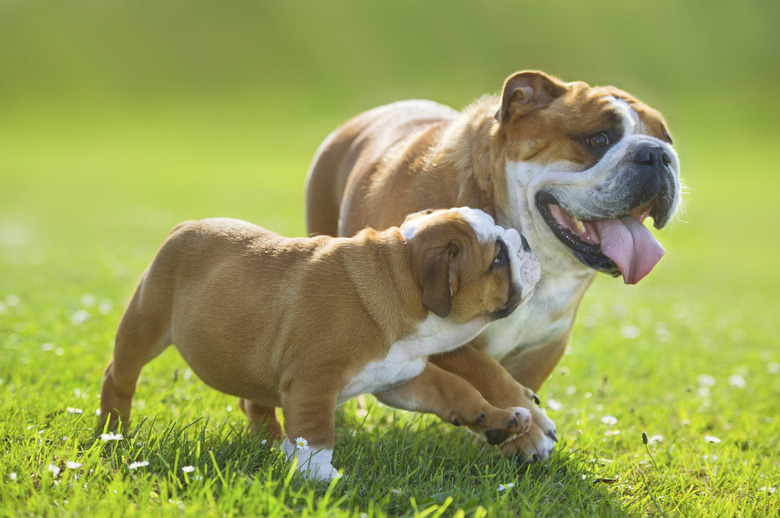How To Care For Female Dogs After They've Had Puppies
Approximately two months after you breed your dog, her puppies arrive. Giving birth — or whelping — might be over, but the mother dog still requires some special care while she's nursing her pups and her body recovers from the pregnancy. You must also stay on the lookout for complications occurring after delivery and while she's nursing her brood. Always keep your veterinarian's contact information handy, for mother and her puppies.
New Mother's Diet
New Mother's Diet
While your dog isn't eating for four, five, six or whatever number of puppies she carried, she's still responsible for their nourishment through her milk. That means she needs plenty of high-calorie, high-protein dog food. You were probably feeding her a similar diet during her pregnancy. She should have food and fresh water available at all times during the first few weeks after delivery, as that's when she's producing the most milk. As she gradually weans her puppies and you start feeding them puppy food at 4 weeks of age, you can cut back on mama's meals. By the time the puppies are fully weaned, at about two months, your dog consume her normal, pre-pregnancy diet.
A Trip to the Vet
A Trip to the Vet
Take your dog and her puppies for a veterinary examination within 48 hours after birth. If possible, make the appointment within 24 hours. Your vet conducts a physical on the puppies and the mom. He'll want to make sure that no more puppies remain in the uterus and that all of the placentas passed after birth. A retained placenta can result in metritis, a serious uterine infection. Symptoms of metritis include pus emanating from the vulva, fever and depression. Bring your dog to the vet immediately if she exhibits any of these symptoms.
Nipple Care
Nipple Care
Inspect your dog's nipples each day while she's nursing. Wipe off any dried secretions with warm water. Nursing mothers are at risk for mastitis, or inflammation of the mammary glands. Symptoms include swollen, painful nipples. Affected nipples are hot to the touch; your dog might spike a fever. Take your dog to the vet if you suspect mastitis. If your dog's nipples are infected, your vet will prescribe an antibiotic. Your vet will inform you whether your dog can continue nursing or whether you must bottle-feed the puppies.
No Canine Socializing
Your vet advised you to keep your pregnant dog away from other canines for the final three weeks of her gestation. The same advice holds true for the first three weeks after giving birth. That's because puppies are extremely vulnerable to the canine herpesvirus, which doesn't cause many problems in adult dogs but can kill young puppies. Even if you have other adult, fully vaccinated dogs in your house, keep them away from the mother and puppies. Take the mother dog out for brief — but frequent — potty breaks for minimal exposure rather than short walks, unless you can guarantee she won't encounter another canine.
Always check with your veterinarian before changing your pet's diet, medication, or physical activity routines. This information is not a substitute for a vet's opinion.
